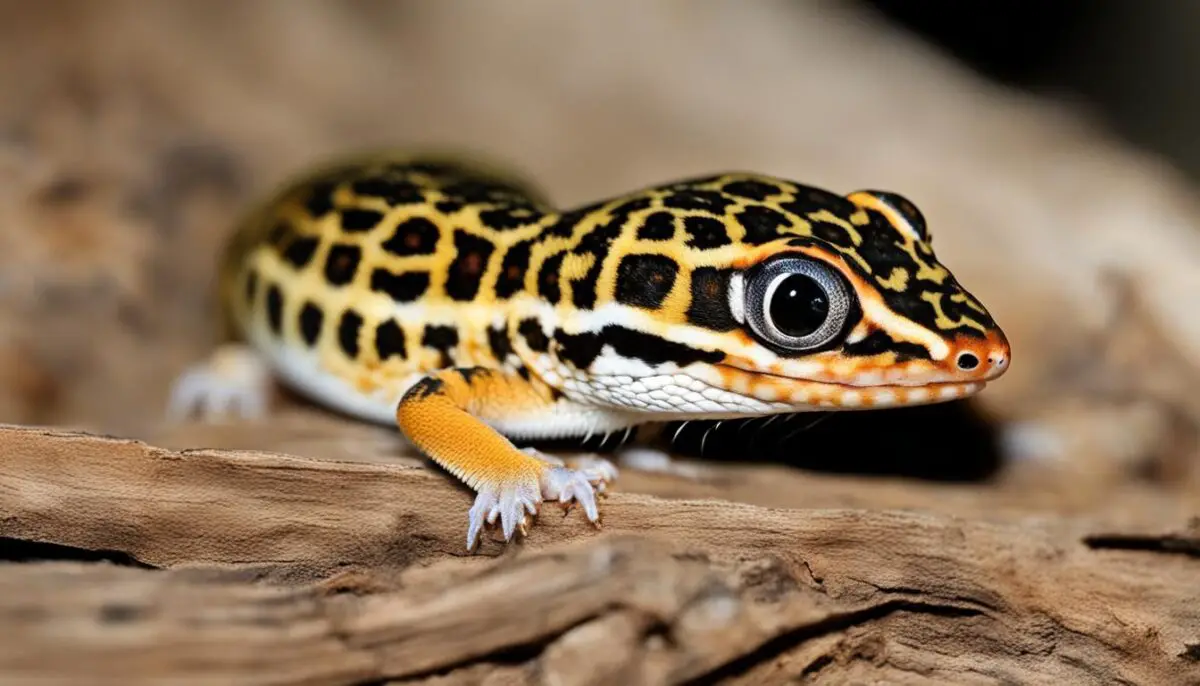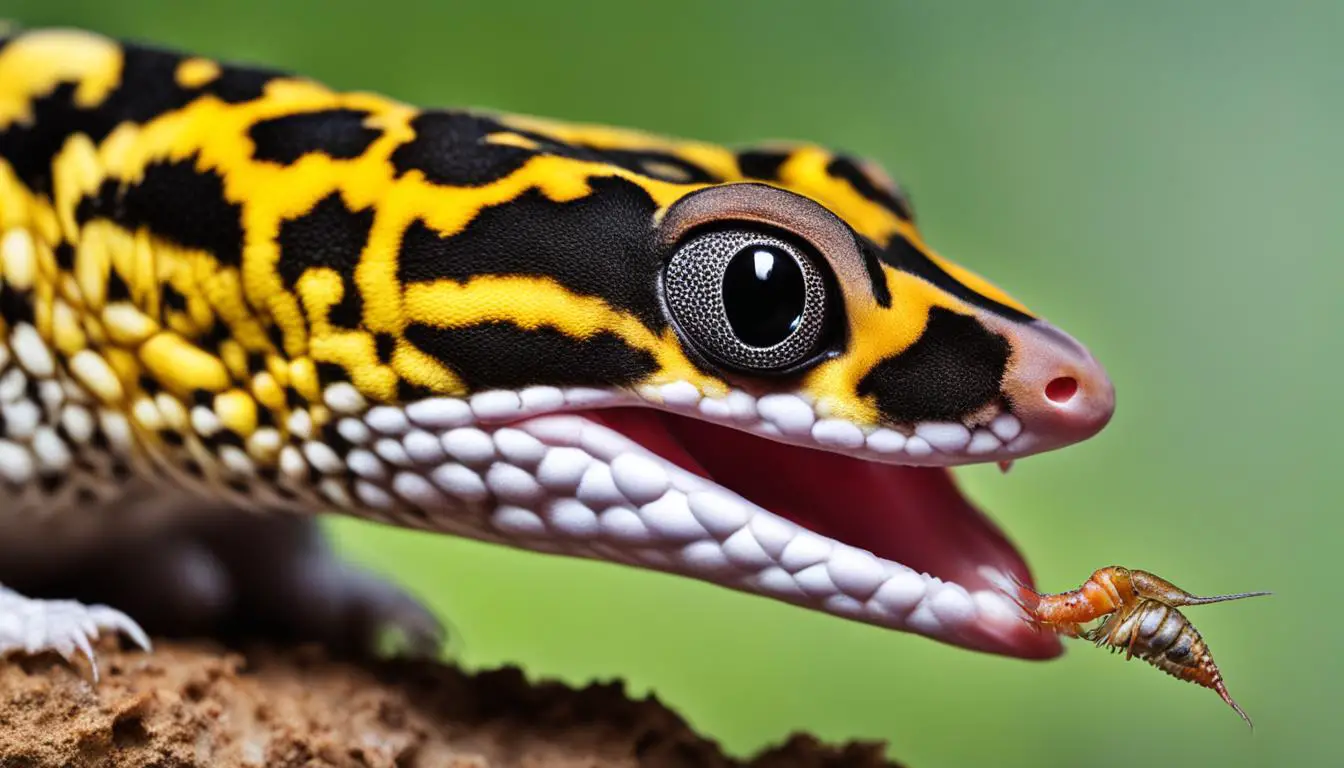Leopard geckos are fascinating reptiles renowned for their unique appearance and dietary preferences. As an owner, you might wonder if it is safe to feed your leopard gecko mealworm beetles. In this article, we will explore whether leopard geckos can eat these beetles, their nutritional benefits, risks to consider, and feeding recommendations. Let’s dive in!
Key Takeaways:
- Leopard geckos can eat mealworm beetles, but it depends on their individual preferences.
- Mealworm beetles are relatively easy to breed and can be a cost-effective food source for reptile owners.
- Feeding leopard geckos a varied diet is essential for their overall health and well-being.
- Mealworm beetles provide leopard geckos with protein, calcium, phosphorus, vitamins, and minerals.
- While mealworm beetles offer nutritional benefits, they can be difficult to digest and may cause digestive issues if given in excessive amounts.
Nutritional Benefits of Mealworm Beetles for Leopard Geckos
Mealworm beetles are an excellent addition to a leopard gecko’s diet, offering a variety of nutritional benefits. These beetles are a great source of protein, containing approximately 23-25% protein content, which is essential for growth, muscle development, and the production of enzymes and hormones in leopard geckos.
What sets mealworm beetles apart is their low-fat content, making them an ideal choice for leopard geckos that require a low-fat diet to prevent obesity. Additionally, these beetles are rich in calcium, a crucial mineral for bone growth and maintenance, promoting strong skeletal health in leopard geckos. They also provide phosphorus, an important mineral for energy metabolism and overall vitality.
Furthermore, mealworm beetles contain various vitamins and minerals that support the overall health of leopard geckos. These include B12, which aids in neurological function, vitamin E for antioxidant protection, zinc for immune system support, and iron for oxygen transport in the body. The chitin found in mealworm beetles can also aid in digestion and promote the proper movement of food through the leopard gecko’s digestive tract.
To summarize, mealworm beetles offer numerous nutritional benefits for leopard geckos, including high protein content, low fat levels, and essential vitamins and minerals. Incorporating these beetles into a varied and balanced diet can contribute to the overall well-being and optimal health of your leopard gecko.
| Nutrient | Amount per 100g* |
|---|---|
| Protein | 23-25g |
| Fat | ~3g |
| Calcium | 15-18mg |
| Phosphorus | ~250mg |
| Vitamin B12 | 2-3mcg |
| Vitamin E | ~0.5mg |
| Zinc | 2-3mg |
| Iron | ~3mg |
*Values may vary depending on the source and specific conditions of breeding.

Risks and Considerations of Feeding Mealworm Beetles to Leopard Geckos
While mealworm beetles can offer nutritional benefits, there are also risks and considerations to keep in mind when feeding them to leopard geckos. The hard exoskeleton and high chitin content of mealworm beetles can make them difficult to digest, potentially leading to impaction in leopard geckos. Impaction occurs when an animal is unable to pass waste through its digestive system and can be a serious condition.
Feeding larger beetles to small geckos may also cause choking or digestive problems. It’s important to feed smaller mealworm beetles and cut them into small portions to prevent these issues.
Additionally, mealworm beetles have a terrible smell that may repulse leopard geckos and affect their feeding habits.
It is essential to be cautious when offering mealworm beetles to leopard geckos. The hard exoskeleton and high chitin content make them challenging to digest, increasing the risk of impaction. This can potentially be a serious condition that hampers the gecko’s ability to pass waste through its digestive system. Consequently, it is recommended to feed smaller mealworm beetles to prevent choking or other digestive problems, especially when feeding smaller geckos. Cutting the beetles into smaller portions can ensure that they are easily manageable during ingestion.
Another important aspect to consider is the smell of mealworm beetles. The odor emitted by these beetles can be repulsive to leopard geckos, potentially deterring them from consuming the beetles. This could lead to a decrease in their food intake and pose a challenge for gecko owners.
Feeding Recommendations and Tips for Leopard Geckos
When it comes to feeding leopard geckos, following the right recommendations and tips is crucial for their health and well-being. Whether you have a baby, juvenile, or adult leopard gecko, here are some guidelines to keep in mind:
1. Feeding Schedule
The feeding frequency will vary based on your gecko’s age and size. Here’s a general guideline:
- Leopard gecko babies should be fed every day with small crickets or mealworms until they reach a length of 4 inches.
- Juvenile geckos can be fed eight to ten small mealworms or five to six larger worms.
- Adult leopard geckos can be fed 2-3 times per week with 6-7 large crickets or mealworms. Consider supplementing their diet with waxworms or calciworms occasionally.
2. Variety in Diet
While mealworm beetles can be included in your gecko’s diet, it’s important to provide a variety of foods. Avoid relying solely on mealworm beetles as the main source of protein. Offering different insects like crickets, dubia roaches, and silkworms ensures a balanced nutritional intake for your gecko.
3. Supplementing with Calcium and Vitamins
For optimal nutrition, it’s essential to dust the insects with calcium or vitamin supplements before feeding them to your gecko. This helps to prevent any deficiencies and promotes healthy bone growth.
4. Housing Mealworm Beetles
If you choose to breed mealworm beetles to provide a steady supply of food, it’s crucial to create suitable housing conditions. Keep them in a separate container with the correct temperature and humidity levels. This ensures the production of healthy and nutritious beetles for your gecko’s diet.
By following these feeding recommendations and tips, you can ensure that your leopard gecko receives a well-rounded diet and stays healthy.
Conclusion
In conclusion, it is important to consider the implications of feeding mealworm beetles as a regular part of a leopard gecko’s diet. While leopard geckos can eat mealworm beetles, these insects can pose potential risks to their digestive system. The difficulty in digesting the hard exoskeleton and high chitin content of mealworm beetles can lead to impaction and other digestive issues in geckos. Therefore, it is recommended to feed leopard geckos more easily digestible insects, such as mealworms, supplemented with a balanced diet that includes a variety of foods.
While mealworm beetles offer some nutritional benefits, they should be fed in moderation and not be the sole source of protein for leopard geckos. It is vital to provide proper care and follow feeding practices that promote the overall health and well-being of the geckos. This includes offering a diverse diet, ensuring the insects are properly supplemented with essential nutrients, and creating a suitable breeding environment for mealworm beetles for a steady and healthy supply.
Ultimately, leopard gecko care and diet should prioritize the gecko’s digestive health and nutritional needs. By offering a balanced and varied diet, incorporating easily digestible insects in appropriate quantities, and considering the specific requirements of leopard geckos, owners can ensure the optimal care and well-being of their beloved reptile companions.
FAQ
Can leopard geckos eat mealworm beetles?
Yes, leopard geckos can consume mealworm beetles, but it depends on each gecko’s preference.
Are mealworm beetles a cost-effective food source for leopard geckos?
Yes, mealworm beetles are relatively easy to breed and can be a cost-effective food source for reptile owners.
What are the nutritional benefits of mealworm beetles for leopard geckos?
Mealworm beetles are a great source of protein, low in fat, rich in calcium and phosphorus, and contain vitamins and minerals that support overall health.
What are the risks and considerations of feeding mealworm beetles to leopard geckos?
Mealworm beetles can be difficult to digest and may cause impaction or other digestive issues in geckos. The hard exoskeleton and high chitin content of beetles can be problematic.
How often should leopard geckos be fed and what should their diet consist of?
Leopard gecko babies should be fed every day with small crickets or mealworms. Juvenile geckos can be fed eight to ten small mealworms or five to six larger worms. Adult geckos can be fed 2-3 times per week with 6-7 large crickets or mealworms, supplemented with waxworms or calciworms. A varied diet is essential.

